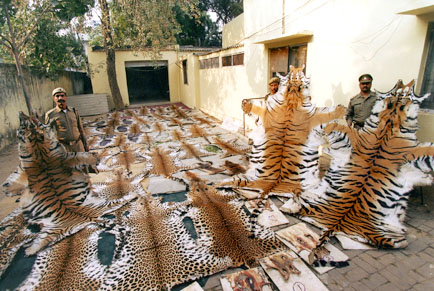|

Siberian tigers, along with the other tigers, are an endangered
species. Only six of these species are still around and three others have
become extinct. This means that these other six species are near extinction
also. Only about
350-500 Siberian tigers are left in the wild, and about 500 are captive.
The 500 that are captive are part of conservation programs such as the Species
Survival Program (SSP) which breeds the tigers to make their population size
grow and keep them from becoming extinct.
Threats
*Poaching- Siberian tigers are killed for their parts.
China and Taiwan believe that tiger parts hold cures for many different deadly
diseases. The poachers kill the tigers and sell them to China and Taiwan
for around $30,000 each.
*Habitat loss- Because of forest destruction the tigers
have less forests to live in and fewer prey. These tigers need a lot of
area to hunt in and destroying their habitat confines them into smaller areas.
Not only is destroying the forests taking away their habitats, but it is also
killing and taking away homes for the tigers' prey. Because the tigers
have less prey, they will go near towns to eat things like chickens and dogs,
where they are usually killed.
*Isolation- As humans move further into the forests, they
separate the tigers' habitat. This leads to the separation of tiger
populations which causes interbreeding within isolated groups. This
reduces the genetic diversity of the Siberian tigers.
What is being done
In the 1970's the Soviet Union made efforts to protect the
tigers' territory in far east Siberia. Eventually Russia took over, and
began to cut down some of the trees in the area. Tigers are also protected
by the Convention on International Trade of Endangered Species (CITES).
The law under CITES prohibits the trade of tigers and their parts between
countries. There are also many organizations that people can donate to
that offer help to save the tigers. One is listed below.
If you would like to help save the tiger,
contact:
Save the Tiger Fund

The National Fish and Wildlife
Foundation
1120 Connecticut Avenue, N.W.
Suite 900
Washington, D.C. 20036
(202) 857-0166
| 